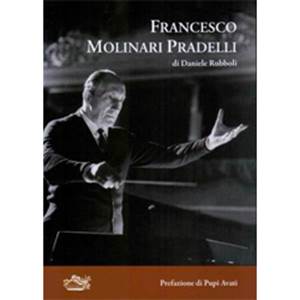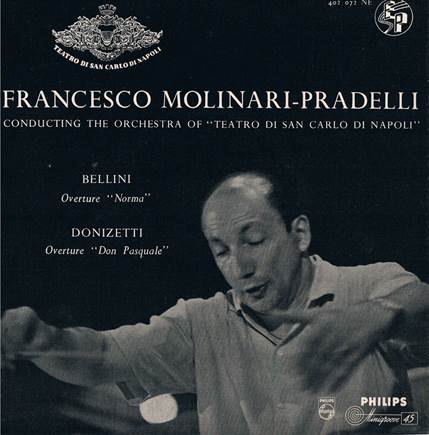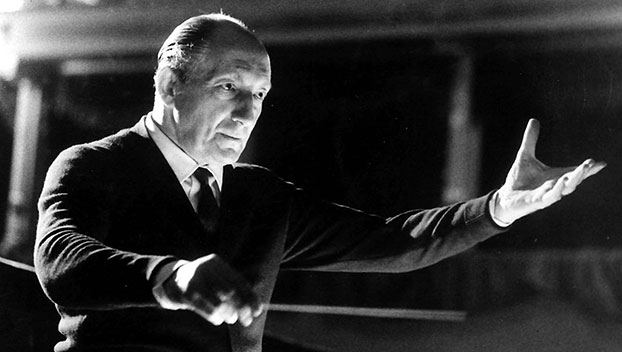
Francesco Molinari Pradelli by Daniele Rubboli

Azzali Editori 2013, 423 p.
Bigoted and sloppy ! I know that’s a harsh judgment for the author of the conductor’s biography but the truth it is. The book starts with a rather short biography of 90 pages which is mainly a rehash of the excellent chronology further on. When there is something personal and interesting to tell on Molinari Pradelli, Rubboli wraps himself in a time honoured hypocrite Italian tradition (often deriving from a catholic heritage – As a former Flemish catholic I recognize the signs). The author whispers some tales but refuses to call a spade a spade. Either one tells what one knows if one writes a book on a historical figure or one keeps silent.
Examples ? Take that double name. Rubboli tells us father Pradelli had been married before and therefore Francesco got the name of his mother until at age nineteen he took the name of his father as well. You have to know a little of Italy’s history or otherwise you wouldn’t know the conductor was born out of marriage as papa was not able to divorce. Therefore bastard Francesco got the name of his mother. Rubboli doesn’t tell us either if papa and mama eventually married (possible after papa’s first spouse had died) and legitimized Francesco. So we don’t get to know if Molinari Pradelli was the conductor’s official name or his artist name.
Mr. Rubboli informs us too Molinari was extremely fond of his family (wife and four children) though it was Mrs. Molinari’s common sense which saved the marriage as the gentleman philandered a lot and had a steamy relation with a famous mezzo. A serious author either gives us that lady’s name or he doesn’t mention this tidbit. I’m sure most readers would love to know more about the conductors’ sexual behaviour. This is not just sensation seeking because quite a lot of female careers in opera were influenced for better (Toscanini’s Herva Nelli) or for worse (Witness Olivero’s attack on Serafin when she refused to welcome him in her bed) by a conductor’s influence. The same hypocrisy is to be found in Rubboli mentioning that Molinari - after his wife’s death- soon remarried with a lady “molto piu giovane”. Either he tells us how much younger she was (did Molinari surpass the 44 year record gap by his colleague Gavazzeni and soprano Denia Mazzola ?) or he shuts up.
Sloppiness there too is in this probably in haste written book. The author tells us the second marriage took place in 1976; the year when according to Rubboli Molinari conducted La forza del destino at the Verona arena. The chronology however tells us Forza was performed in 1975 which is correct (I assisted to a performance; the last one in a complete opera in the arena by Bergonzi). Elsewhere Rubboli mentions that Domingo made his début in the arena in 1968 while the chronology gives 1969 (correct too. I cannot help it but I was there as well . During the riddle scene Domingo ran upwards on the steps, stumbled but did not miss a single beat). The chronology in itself is fine but often names are mistyped or careless jotted down in the worst Patrick Bade-tradition (e.g. first Jon and a few lines further John Vickers; Cristina Deutekom in the text and Cristine in the index; Gré Brouwensthe in the chronology and the correct Brouwenstein in the index; Jamec McCracken and James MacCracken (instead of McCracken) and Hilde Guden (instead of Güden) in the chronology; Friedrick instead of Frederic Guthrie in the chronology) etc. etc.

Molinari was known to be a harsh taskmaster and extremely jealous of some singers’ success. Singers who had not done their homework or who thought opera as a vehicle for their voices in Molinari’s opinion often quarrelled or almost came to blows with the conductor . Mr. Rubboli mentions the troubles with Pavarotti when the tenor’s supporters hysterically applauded the singer during a dress rehearsal for La Favorita.. Molinari was one of the reasons Richard Bonynge took up conducting. In San Francisco the young and extremely successful Joan Sutherland started to embellish her cabaletta’s in the best belcanto tradition and was cut short by the conductor who had not the slightest feeling for a tradition he had not known and studied in his youth. “Pig” Bonynge cried and stormed out of the house intending to conduct himself according to the rules of early belcanto. However these incidents are well known from other sources and Rubboli has not taken pains to look further into Molinari’s track record with singers. We know from Roberto Bauer’s letters to Bing that Franco Corelli almost beheaded the conductor during the recording of Turandot for EMI. A real gem is revealed to us in that most dreadful aspect of Azzali’s biographies of musicians: testimonies and homage by friends, family and admirers; mostly proofs of false respect. Bergonzi in his homage tells us of his admiration, friendship etc. with the conductor. As Molinari died in 1986 some former singers are more honest now the “gentleman” is no longer among us. Wilma Vernocchi (a sympathetic small lirico I once heard in concert) tells us she was in La Scala’s L’ Elisir d’Amore as Giannetta when “Molinari admiring” Bergonzi and the conductor were at each other’s throat. Vernocchi tells us the tenor on purpose used the familiar ‘tu” instead of the polite “Lei” always used to address a conductor. And Bergonzi roared his head off screaming he had cancelled his contract for the EMI recording of Elisir when he heard Molinari was to be the conductor. I always wondered why musical, intelligent but charmless un-Italian Gedda got the role instead of Bergonzi and our loss it is. Nevertheless as Italian opera was a small word tenor and conductor sooner or later had to reconcile and I vividly remember Molinari conducting Bergonzi in Forza and Gioconda in Verona and graciously indulging each time in an encore when Bergonzi sang a magnificent and mellifluous “Cielo e mar.” Interesting too the single sentence Mirella Freni writes: “ Molinari remains in my memories for the triumphs we both got in important theatres”. Full stop. One suspects Freni with her very limited knowledge of solfège was often on the receiving end of Molinari’s wrath.

There is a full discography (official and live recordings) but there is no discussion of the conductor’s merit in this artistic heritage. What was the essence of his music-making ? Was he just a good routinier or did he succeed in making music better than it was ? Only when one studies the recording dates it becomes clear that Mr Rubboli forgets to discuss Molinari’s “parabola”. The conductor ended his career in 1983 but no major firm ever asked him to record a complete opera after 1967. By that time the majors in the industry probably knew his reputation too well and they correctly reasoned collectors buy complete recordings for the singer and not for a solid though not exceptional conductor (the names of Corelli, Nilsson and Scotto were twice as prominent on the original box of Turandot than Molinari’s). Especially disillusioning is Giorgio Gualerzi’s chapter on “Direttore per il canto”. From this grand old man of music criticism one might expect some deeper insights but he simply took a look at the chronology and in his turn he too started writing” and then he conducted signor X while on his next assignment signora Y was singing.” All in all a book not to be recommended unless you are a chronology collector.
Jan Neckers